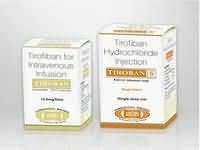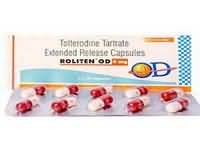indoramin

indoramin
CLINICAL USE
Alpha-adrenoceptor blocker:Hypertension Benign prostatic hyperplasia (BPH)
DOSE IN NORMAL RENAL FUNCTION
Hypertension: 25 mg twice daily initially, increasing to a maximum of 200 mg daily in 2–3 divided dosesBenign prostatic hyperplasia: 20 mg twice daily increasing to a maximum of 100 mg daily in divided doses
PHARMACOKINETICS
Molecular weight :383.9 (as hydrochloride) %Protein binding :>90 %Excreted unchanged in urine : <2 Volume of distribution (L/kg) :7.4half-life – normal/ESRD (hrs) :5/Increased by 50% (reduced by 40% in HD : patients) DOSE IN RENAL IMPAIRMENT
GFR (mL/MIN)
20 to 50 : Dose as in normal renal function 10 to 20 : Dose as in normal renal function <10 : Dose as in normal renal function. See ‘Other Information’ DOSE IN PATIENTS UNDERGOING RENAL REPLACEMENT THERAPIES
CAPD :Not dialysed. Dose as in GFR <10 mL/min HD :Not dialysed. Dose as in GFR <10 mL/minHDF/high flux :Unknown dialysability. Dose as in GFR <10 mL/minCAV/VVHD :Not dialysed. Dose as in normal renal function IMPORTANT DRUG INTERACTIONS
Potentially hazardous interactions with other drugs Anaesthetics: enhanced hypotensive effect NSAIDs: antagonism of hypotensive effect Antidepressants: enhanced hypotensive effect, especially with MAOIs and linezolid – avoid concomitant useBeta-blockers: enhanced hypotensive effect; increased risk of first dose hypotensive effect Calcium-channel blockers: enhanced hypotensive effect; increased risk of first dose hypotensive effect Diuretics: enhanced hypotensive effect; increased risk of first dose hypotensive effect Moxisylyte: possibly severe postural hypotension when used in combination Vardenafil, sildenafil and tadalafil: enhanced hypotensive effect – avoid concomitant use ADMINISTRATION
Reconstition
– Route
Oral Rate of Administration
–Comments
– OTHER INFORMATION
For BPH, 20 mg at night may be adequate in the elderlyIn the elderly the half-life can be prolonged to 6.6–32.8 hours with a mean of 14.7 hours due to reduced clearanceSeyffart recommends a maximum dose of 50 mg daily for patients with severe renal impairment if not on dialysis. Dialysis patients should receive a maximum of 100 mg daily on dialysis days, but 50 mg on non-dialysis days.
See how to identify renal failure stages according to GFR calculation
See how to diagnose irreversible renal disease
Home









